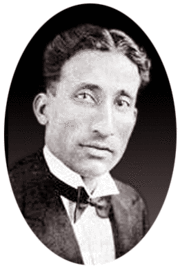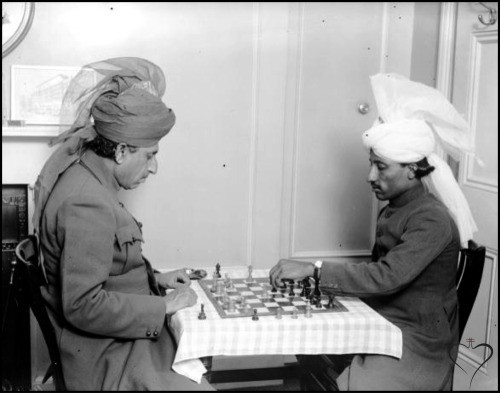
- This event has passed.
Death Anniversary of Malik Mir Sultan Khan (1905 25-iv-1966)
April 25, 2020

Death Anniversary of Malik Mir Sultan Khan (1905 25-iv-1966)
From The Encyclopedia of Chess by Hooper & Whyld :
Perhaps the greatest natural player of modern times. Born in the Punjab, he learned Indian chess when he was nine, was taken into the household of Sir Umar Hay at Khan, and learned the international game in 1926, Two years later he won the All-India Championship and in the spring of 1929 his patron and master took him to London. Within a few months he won the British Championship, returning to India shortly afterwards. In Europe in May 1930 he began a brief career that included defeats of many leading players.
A striking figure, of dark complexion, with a lean face and broad forehead, his black hair usually turban tied, he sat at the board impassively, showing no emotion in positions good or bad. He did not believe he possessed any special skill, rather that the player applying the greater concentration should win. In events of about category 10 Sultan Khan came second to Tartakower at Liege 1930, third (+5=2-2) after Euwe and Capablanca at Hastings 1930-1, and third ( + 6=3—2) equal with Kashdan after Alekhine and Flohr at London 1932, In events of about category 9 he came fourth or equal fourth at Scarborough 1930, Hastings 1931-2, and Berne 1932 ( + 10=2-3). Sultan Khan won the British Championship again in 1932 and 1933 and played first board for the British Chess Federation in the Olympiads of 1930, 1931, and 1933. In match play he defeated Tartakower (+4=5—3) in 1931 and lost to Flohr ( + 1=3—2) in 1932. At the end of 1933 he went back to India at the bidding of his master. When Sir Umar died Sultan Khan was left a small farmstead near his birthplace, and there he lived out his days. Apparently he had few regrets, A friend visiting him in 1958 found him sitting quietly under the shade of a tree smoking his hookah, chatting with
neighbouring farmers while the womenfolk did the work.
In the Indian game of his time the pieces were moved as in international chess but the laws of promotion and stalemate were different, castling was not permitted, and a pawn could not he
advanced two squares on its first move. The game opened slowly with emphasis on positional play rather than tactics, and not surprisingly Sultan Khan became a positional player. He had few peers in the middle-game and was among the world’s best two or three endgame players, but he never mastered the openings which, by nature empirical, cannot be learned by the application of common sense alone*
When Sultan Khan first travelled to Europe his English was so rudimentary that he needed an interpreter. He suffered from bouts of malaria and, in the English climate, from continual colds and throat infections, often turning up to play with his neck swathed in bandages. Unable to read or write, he never studied any hooks on the game, and he was mistakenly put in the hands of trainers who were also his rivals in play. Under these adverse circumstances, and having known the international game for a mere seven years, only half of which was spent in Europe, Sultan Khan nevertheless became one of the world’s best ten players. This achievement brought admiration from Capablanca who called him a genius, an accolade he rarely if ever bestowed on anyone else.
R. N. Coles, Mir Sultan Khan (rev, edn, 1977) contains 64 games.
Sultan Khan-Flohr 3rd match game 1932 Caro-Kann
Defence, Exchange Variation
Here is his Wikipedia entry

Here is an excellent article from chess.com
